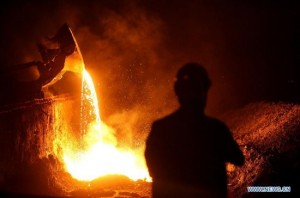 LONDON, March 12 (Reuters) - South Korean steelmaker POSCO , minority-owned by Warren Buffett's Berkshire Hathaway, has cut ties with government entities and sensitive industries in Iran such as energy and continues to trade with private firms, a letter showed.
LONDON, March 12 (Reuters) - South Korean steelmaker POSCO , minority-owned by Warren Buffett's Berkshire Hathaway, has cut ties with government entities and sensitive industries in Iran such as energy and continues to trade with private firms, a letter showed.Tough Western measures imposed on Iran over its disputed nuclear programme have hit many sectors of its economy including steel and other metals, where it is heavily dependent on imports. Tehran says its atomic work is peaceful.
Earlier this month, intelligence and diplomatic sources told Reuters commodities giant Glencore had supplied thousands of tonnes of alumina to an Iranian firm that provided aluminium to Iran's nuclear programme.
Separately, Swiss-based trade house Trafigura confirmed it had traded with the Iranian firm that the EU says has links to Iran's nuclear programme.
In a letter sent to U.S. pressure group United Against Nuclear Iran (UANI) dated Feb. 28 and seen by Reuters, POSCO, a top global steelmaker, said it had scaled down business with Iran.
"Certain of POSCO's subsidiaries continue to engage in transactions in Iran," POSCO's chief legal officer Song Se-Bin wrote in the letter.
"However, these transactions involve only the civil market. Moreover, these POSCO entities engage in transactions only with Iranian entities that POSCO believes, based on its best due diligence efforts, are not owned or controlled by the Iranian government."
Song said POSCO entities had "completed, terminated or assigned all of their activities related to the sensitive sectors of the Iranian economy - the energy, defence and nuclear sectors".
"Although these efforts have resulted in the loss of certain projects and substantial financial losses to the POSCO entities, POSCO believes it important that it be regarded as a responsible corporate citizen."
A targeted campaign by UANI, which includes former U.S. ambassadors as well as former CIA and British intelligence chiefs on its board, has led to several foreign companies in sectors including shipping to exit Iran. UANI, which is funded by private donations and backs tougher sanctions on Tehran, had called on POSCO to cease its Iran trade.
UANI chief executive Mark Wallace said it appreciated the company had taken multiple steps to reduce its Iran business.
"We continue to call, however, for POSCO to fully end its business in Iran," said Wallace, a former U.S. ambassador to the United Nations.
"Given the nature of the business, the only way for POSCO to eliminate its exposure to the Iranian regime and IRGC-controlled entities is to completely pull out of the country," he said, referring to the Revolutionary Guards, which reports directly to Iran's Supreme Leader.
TRADE PRESSURE
POSCO, which is 5.1 percent owned by Berkshire Hathaway , is the world's No.5 steelmaker by output.
Buffett's business partner Charlie Munger has frequently praised POSCO as being, in his opinion, the best-run steelmaker in the world. Buffett, via his assistant, could not be immediately reached for comment.
When contacted about its Iran deals, POSCO spokeswoman Jiyoung Kim said: "POSCO and its subsidiaries stopped trades with Iranian government and state-run Iranian companies.
"POSCO will abide by the law regarding U.S. sanctions on Iran, and plans to actively cooperate with U.S. policies."
Sanctions imposed by the European Union last year on sales of steel and other key materials to Iran have prompted many traders and producers to halt sales, hitting Russian steel producers, which were heavily reliant on the Iranian market.
A UK based executive with a steel and iron trading firm said it had halted trade with Iran partly over payment difficulties due to banking restrictions, but also over image.
"I don't think companies want to be seen to be dealing with them purely because of a bad company image, reputation risk. Also, it has become more difficult to trade," the source said. "There are so many places we can trade with other than Iran that I think we can afford to miss that one out for the time being."
POSCO's Song said in the letter it followed strict guidelines on trading with Iran which required written confirmation from the Korea Strategic Trade Institute, which is under Seoul's economy ministry, that any investment or trading did not directly or significantly contribute to enhancing Iran's oil capabilities or involve blacklisted entities or individuals.
Song said POSCO personnel would "face disciplinary action for non-compliance" if they did not adhere to its trading policies in Iran.
"POSCO shares UANI's goal of thwarting Iran's nuclear programme," Song said.
Despite tougher measures, western powers face difficulties in curbing Iran's ability to do business with the rest of the world.
By Reuters
The Iran Project is not responsible for the content of quoted articles.










